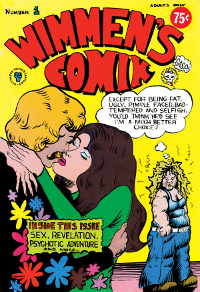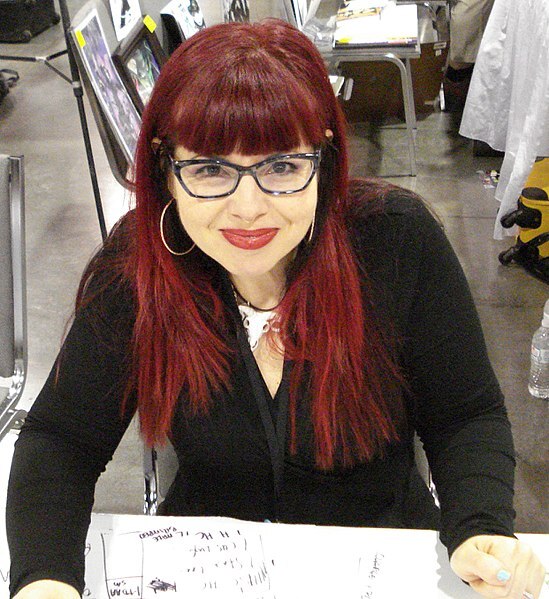As part of Women's History Month activities, we're shining the spotlight on women in comics and manga. Every Tuesday, we'll feature amazing women who have left a mark on the comics and manga industries. Today, we'll be covering Wimmen's Comix and some of the women speaking out for visibility for both women creators and characters.
Wimmen's Comix
Wimmen's Comix, later renamed Wimmin's Comix, emerged as a groundbreaking all-female underground comics anthology from 1972 to 1992. It followed the influential 1970 publication of It Ain't Me, Babe, the inaugural American comic solely crafted by women, spearheaded by the prominent figure Trina Robbins within the Berkeley feminist newspaper scene. Many contributors from It Ain't Me, Babe transitioned to Wimmen's Comix, further solidifying its significance in the feminist comic movement.
Each installment of Wimmen's Comix was overseen by different editors, with Last Gasp, Renegade Press, and Rip Off Press taking turns in its publication. However, in 1992, amidst discussions on gender politics, the title underwent a change to Wimmin's Comix for issue #17, reflecting a shift in linguistic consciousness. Despite its cultural impact and role as a launchpad for burgeoning cartoonists, the anthology faced challenges, including financial constraints and distribution issues, ultimately leading to its discontinuation.
Editor Caryn Leschen highlighted the frustration over the series' demise, citing financial hurdles and gender biases in the comic industry.
"This book has been printed on cheap paper which will turn yellow in a few years. The print run was too small and all the stores, as usual, will sell out, but they won't reorder because 'Women don't buy comix'. Bullshit. How did they sell out in the first place? It's always like that. What a waste of time and energy. Forget it".
Despite its short-lived run and production challenges, Wimmen's Comix remains a pivotal platform that amplified feminist voices and paved the way for subsequent independent female cartoonists' ventures.

Image from Wimmen's Comix Wikipedia page
Kelly Sue DeConnick and #VisibleWomen
All of that said, the spaces for women to feel included in the comic industry has changed. It has improved over time. Women are still struggling, as many of the top-challenged books over the last few years are by women creators. Many of them end up on the banned list for covering “adult topics” such as reproductive justice, sexuality, feminism, sexual harassment and even coming of age stories. One such title that has had notable amounts of trouble is “This One Summer” by Jillian and Mariko Tamaki. The graphic novel was the first ever of its kind to be awarded.
In recent years, the #VisibleWomen movement, initiated by the esteemed figure Kelly Sue DeConnick, has played a significant role in spotlighting female creators within the comic industry. Renowned individuals such as Trina Robbins and Louise Simonson have garnered recognition through this hashtag, amplifying their contributions and achievements.
Louise Simonson's career trajectory began at Warren Publishing, where she ascended to the position of Senior Editor, overseeing notable works like Vampirella. Transitioning to Marvel, Simonson left her mark as both an editor and writer on iconic titles such as Red Sonja, The New Mutants, and Uncanny X-Men. Notably, her co-creation of Doomsday, Superman’s formidable adversary, stands as one of her standout accomplishments.
Kelly Sue DeConnick, beyond pioneering the #VisibleWomen movement, has left a lasting impact on the comic landscape through her creative ventures. Notable among these is the establishment of Bitch Planet with Image Comics, alongside her work on acclaimed titles like Avengers Assemble, Aquaman, and Captain Marvel. DeConnick's advocacy has not only opened doors for aspiring female professionals but also reshaped narratives within the comic realm, fostering spaces for nuanced female characters beyond traditional archetypes.

Image from Kelly Sue DeConnick's Wikipedia page
The Sexy Lamp Test, Bechdel Test, and Refrigerator Women
Writing women can be challenging for anyone, especially for those who don't identify as women, or aren't familiar with women's experiences in societies around the world. The Sexy Lamp Test, coined by Kelly Sue DeConnick, evaluates the representation of female characters in media by questioning whether a female character could be replaced with a sexy lamp without significantly altering the plot.
In contrast, the Bechdel Test, inspired by Alison Bechdel's comic strip, examines whether a work of fiction features at least two named women who talk to each other about something other than a man. While the Bechdel Test assesses the presence of female characters and their interactions, the Sexy Lamp Test scrutinizes the depth and agency of those characters, highlighting broader issues of objectification and gender stereotypes in storytelling. There is still room to allow for more female characters to take the spotlight, and not just be sidepieces, damsels in distress, or victims of violence, also referred to as “refrigerator women.”

Image from Alison Bechdel's Wikipedia page
There are so many more creators I want to include in this article. I could write for days about all of the women that I read about in my research. I feel like I missed out on some form of childhood not knowing about these women and their impacts.
Please read through these sources to learn about even more amazing women. It’s not an exhaustive list, but it can be a fantastic tipping point for anyone wanting to learn more about this hidden history of the comic book industry.
Resources:
- She Changed Comics by CBLDF
- She Changed Comics Honors Trailblazing Women Creators
- How Female Writers Changed the Comic Book Industry
- 12 Women Who Have Helped Transform the Comic Book Industry
- 10 Women Who Changed the Comic Book Industry ( & How)
- Working in the Margins: Women in the Comic Book Industry
If you found this article insightful, please share it with a friend or someone else who might enjoy it! We'll have even more amazing women next week, but in the meantime, let us know your thoughts in the comments.
